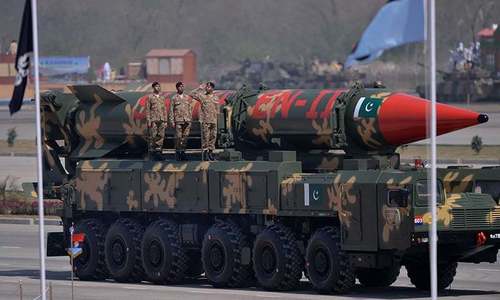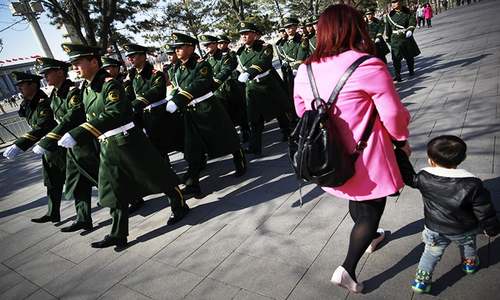KARACHI: Only 10 per cent of the defence budget goes to the navy, making even the day-to-day operations, maintenance and repairs a challenge, while India builds up on its fleet, acquiring warships, aircraft carriers and nuclear submarines, it emerged during a media briefing about the maritime exercise Seaspark 2015.
The exercise began in north Arabian Sea on Tuesday after a gap of three years.
“India has a strong sea strength,” Deputy Chief of Naval Staff (Plans) Commodore Raja Rab Nawaz said while sharing information about the number of warships, etc, acquired by both countries and the navy’s role in the scenario, which may be described as strategically defensive, although tactically offensive.
Later, while answering media’s queries, Deputy Chief of Naval Staff (Operations) Rear Admiral Kaleem Shaukat said: “Our strength as compared to India’s naval strength may be different when compared with various aspects. The ratios come out as something like one-third, one-sixth or one-tenth. The conventional gaps show how behind we are in building our sea strength while India has realised the sea’s importance.
“But, in order to shorten these gaps, the Pakistan Navy, like the Pakistan Army and Pakistan Air Force, has a development plan according to our resources. We also ask the government for extra funding as per our requirements, which does come through. For instance, we approach them case to case for things such as fleet tankers, missile boats and submarines.”
He said India planned to be a big global power through the sea which was not on Pakistan’s agenda at the moment because of monetary reasons as well as the prevalent mindset here.
“Getting aircraft carriers is not a part of our development plan as besides being an asset it can also be a target. Our state cannot afford to use all its navy to protect our aircraft carriers,” he said.
Rear Admiral Shaukat admitted that India’s aircraft carriers, although primarily there to project power, posed a threat. “We’ll see how we can neutralise this threat,” he said, adding that the navy was protecting the disputed Sir Creek area and other sensitive points. “Our marines are deployed in our creek areas.”
When asked if spies or terrorists from across the border might infiltrate into Pakistan while impersonating as fishermen who are picked up by the dozen all the time, he said fishermen were handled by the Pakistan Maritime Security Agency (PMSA).
Rear Admiral Shaukat said that besides 990km of coastal areas, Pakistan had land borders and an agriculture and continental mindset instead of looking to the sea for food. “We have blue water capability but our operations are sustained. We can safeguard our trade. But our merchant fleet has also become smaller. Our fish catch is worth billions of dollars but we are not exporting much. The mindset needs to be changed,” he said.
The navy’s contribution in the fields of education, health and job opportunities for the coastal communities, such as building hospitals in Ormara and Turbat in Balochistan, holding free medical camps and recruiting from the community in Gwadar, were also mentioned. The force carried out extensive search, rescue and relief operations during international and national disasters and contingencies, while playing an important role in rehabilitation, officials said.
Objective of exercise
The deputy chief of naval staff said that besides providing impetus to the country’s resolve for maintaining peace, security and stability in the region, the objective of the exercise was to corroborate the navy’s operational plans, assess its war preparedness and enhance its interoperability with the air force and army.
All operational units of the navy, including ships, submarines, aircraft, unmanned aerial vehicles, special forces and marines, along with elements of the PMSA, PAF and army, are participating in the exercise to make the ports and territorial waters safe from all kinds of threats, including non-traditional challenges such as piracy and pollution.
“During the exercise, full spectrum of threats would be exercised ranging from conventional to asymmetric, cyber and information warfare domains. Besides enhancement of operational preparedness, the exercise will also focus on seaward defence of the coast and their response against emerging non-traditional threats emanating from sea,” the official said.
“Being located at the confluence of world’s major sea routes, Pakistan’s strategic location can be exploited to our advantage through the development of the maritime sector and a strong navy for its effective defence. Pakistan Navy’s operational and development plans are, therefore, focused to maintain a potent and well-balanced naval force to deter aggression at sea. Being an essential appendage to the foreign policy, we also strive to foster stronger navy-to-navy relations through regular exercises and ship visits with regional as well as extra-regional navies,” he added.
The exercise will conclude on Nov 12.
Published in Dawn, November 4th, 2015
On a mobile phone? Get the Dawn Mobile App: Apple Store | Google Play













































